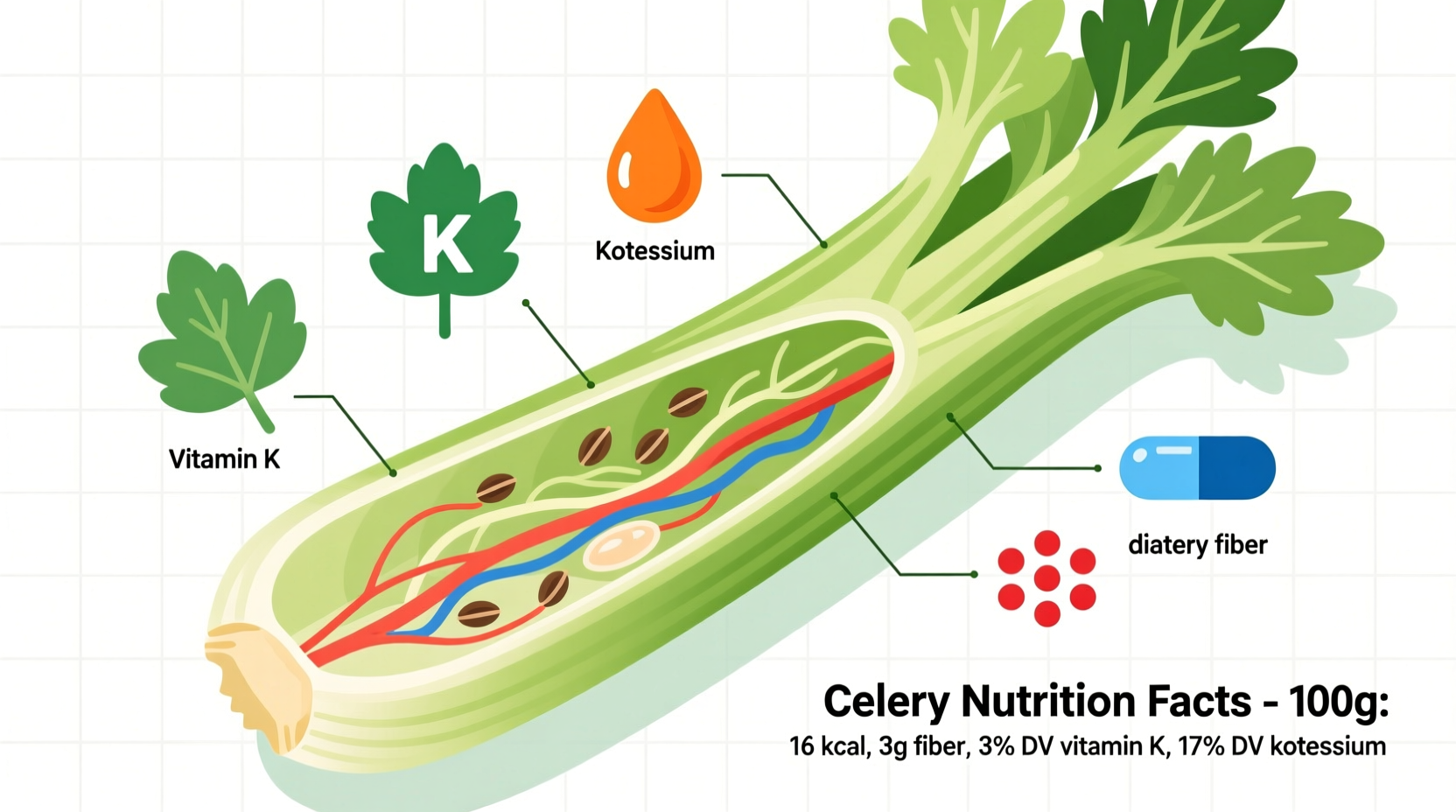When you're considering adding more nutrient-dense vegetables to your diet, celery often gets overlooked despite its impressive nutritional profile. This crisp, refreshing vegetable isn't just a low-calorie snack filler—it contains scientifically-backed compounds that support multiple aspects of health. Understanding exactly what makes celery nutritionally valuable can help you make informed dietary choices that align with your wellness goals.
What Makes Celery Nutritionally Unique
Celery (Apium graveolens) stands out among vegetables due to its distinctive combination of hydration properties and bioactive compounds. Unlike many vegetables that lose nutritional value when processed, celery maintains significant nutrient density whether consumed raw, juiced, or lightly cooked. The vegetable's fibrous structure contains valuable phytonutrients that become more bioavailable through proper preparation techniques.
| Nutrient | Per 100g Raw Celery | Daily Value % | Compared to Cucumber |
|---|---|---|---|
| Calories | 16 kcal | 1% | Similar |
| Vitamin K | 29.6 μg | 37% | 3x higher |
| Potassium | 260 mg | 8% | 2x higher |
| Vitamin C | 3.1 mg | 5% | Higher |
| Dietary Fiber | 1.6 g | 6% | Higher |
This nutritional comparison based on USDA FoodData Central shows celery's advantage over similar hydrating vegetables. While both are excellent low-calorie options, celery provides significantly more vitamin K and potassium than cucumber, making it particularly valuable for bone and cardiovascular health.
Science-Backed Health Benefits of Celery
Hydration and Electrolyte Balance
With approximately 95% water content, celery serves as an exceptional natural hydrator. What makes it superior to plain water is its natural electrolyte profile—particularly potassium and sodium—which helps maintain proper fluid balance. This combination makes celery particularly beneficial after exercise or during hot weather when electrolyte replacement is crucial. Registered dietitians often recommend including celery in post-workout snacks for this reason.
Anti-Inflammatory Properties
Celery contains unique phytochemicals called phthalides, along with flavonoids like apigenin and luteolin, which research shows have significant anti-inflammatory effects. A 2022 review published in Nutrients highlighted that these compounds may help reduce markers of inflammation in the body, potentially benefiting those with chronic inflammatory conditions. The anti-inflammatory effects of celery are most pronounced when consumed raw or lightly steamed.
Digestive Health Support
The dietary fiber in celery (1.6g per 100g) works in two important ways for digestive health. The insoluble fiber adds bulk to stool, promoting regular bowel movements, while the soluble fiber serves as prebiotic nourishment for beneficial gut bacteria. Unlike some high-fiber foods that can cause bloating, celery's gentle fiber profile makes it suitable even for sensitive digestive systems when consumed in moderate portions.
Cardiovascular Protection
Multiple studies, including research from the National Institutes of Health, indicate that celery's phthalides may help relax artery walls and improve blood flow. The vegetable's potassium content (260mg per 100g) also contributes to healthy blood pressure regulation. For optimal cardiovascular benefits, nutrition experts recommend consuming celery as part of a varied plant-based diet rather than relying on it as a standalone solution.
Practical Ways to Maximize Celery's Nutritional Benefits
Optimal Consumption Amounts
While celery is extremely safe for most people, understanding appropriate portions ensures you receive maximum benefits without potential drawbacks. Registered dietitians typically recommend:
- 1-2 cups (100-200g) daily for general health maintenance
- Up to 3 cups when specifically targeting hydration needs
- Limit to 1 cup daily if taking blood thinners (due to vitamin K content)
Preparation Methods That Preserve Nutrients
The way you prepare celery significantly impacts its nutritional value. Research from the U.S. Food and Drug Administration shows that:
- Raw consumption preserves the highest levels of vitamin C and heat-sensitive antioxidants
- Light steaming (2-3 minutes) increases bioavailability of certain carotenoids
- Blanching for salads maintains crunch while slightly enhancing certain phytonutrients
- Avoid prolonged boiling which leaches water-soluble nutrients
Important Context and Limitations
While celery offers numerous health benefits, it's essential to understand its role within a balanced diet. Celery alone cannot address significant nutritional deficiencies or replace medical treatment for health conditions. Individuals taking blood thinners like warfarin should maintain consistent vitamin K intake, as fluctuations can affect medication efficacy. Those with celery allergies (more common in Europe than North America) should avoid it entirely.
When comparing celery to other vegetables, it's less nutrient-dense than leafy greens but offers unique hydration properties that make it valuable in specific dietary contexts. Nutrition science consistently shows that dietary variety produces better health outcomes than focusing on any single 'superfood'—including celery.

Frequently Asked Questions
Does celery really have negative calories?
No, the concept of 'negative calorie' foods is a myth. While celery is extremely low-calorie (about 16 calories per cup), your body expends some energy digesting it, but not more than the calories it contains. The thermic effect of food for celery is estimated at 5-10% of its caloric content, not 100% or more.
Can celery help lower blood pressure naturally?
Research suggests celery may contribute to blood pressure management due to its phthalide content and potassium levels. A study in the Journal of Medicinal Food found that celery extract showed potential blood pressure-lowering effects, but whole food consumption as part of a balanced diet produces more modest results than concentrated extracts.
Is celery juice as nutritious as eating whole celery?
Celery juice lacks the dietary fiber found in whole celery, which is essential for digestive health and blood sugar regulation. While juice contains water-soluble vitamins and phytonutrients, you lose significant nutritional benefits by removing the fibrous pulp. Nutrition experts generally recommend consuming whole celery rather than relying on juice for maximum health benefits.
How does celery compare to other vegetables for vitamin K content?
Celery provides about 37% of the daily value for vitamin K per 100g, which is substantial but less than leafy greens. For comparison: kale offers 600-800% DV, spinach provides 350-450% DV, and broccoli contains about 100% DV per 100g. Celery's advantage is its extremely low calorie count relative to its vitamin K content, making it efficient for those monitoring calorie intake.











 浙公网安备
33010002000092号
浙公网安备
33010002000092号 浙B2-20120091-4
浙B2-20120091-4